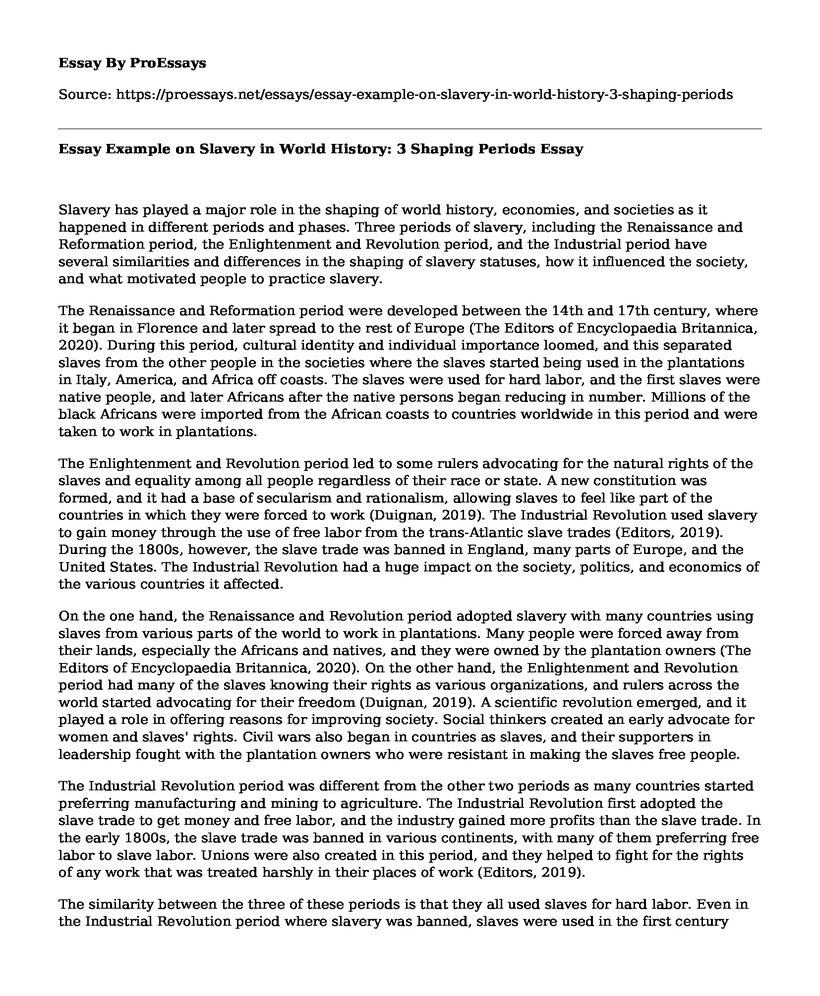Slavery has played a major role in the shaping of world history, economies, and societies as it happened in different periods and phases. Three periods of slavery, including the Renaissance and Reformation period, the Enlightenment and Revolution period, and the Industrial period have several similarities and differences in the shaping of slavery statuses, how it influenced the society, and what motivated people to practice slavery.
The Renaissance and Reformation period were developed between the 14th and 17th century, where it began in Florence and later spread to the rest of Europe (The Editors of Encyclopaedia Britannica, 2020). During this period, cultural identity and individual importance loomed, and this separated slaves from the other people in the societies where the slaves started being used in the plantations in Italy, America, and Africa off coasts. The slaves were used for hard labor, and the first slaves were native people, and later Africans after the native persons began reducing in number. Millions of the black Africans were imported from the African coasts to countries worldwide in this period and were taken to work in plantations.
The Enlightenment and Revolution period led to some rulers advocating for the natural rights of the slaves and equality among all people regardless of their race or state. A new constitution was formed, and it had a base of secularism and rationalism, allowing slaves to feel like part of the countries in which they were forced to work (Duignan, 2019). The Industrial Revolution used slavery to gain money through the use of free labor from the trans-Atlantic slave trades (Editors, 2019). During the 1800s, however, the slave trade was banned in England, many parts of Europe, and the United States. The Industrial Revolution had a huge impact on the society, politics, and economics of the various countries it affected.
On the one hand, the Renaissance and Revolution period adopted slavery with many countries using slaves from various parts of the world to work in plantations. Many people were forced away from their lands, especially the Africans and natives, and they were owned by the plantation owners (The Editors of Encyclopaedia Britannica, 2020). On the other hand, the Enlightenment and Revolution period had many of the slaves knowing their rights as various organizations, and rulers across the world started advocating for their freedom (Duignan, 2019). A scientific revolution emerged, and it played a role in offering reasons for improving society. Social thinkers created an early advocate for women and slaves' rights. Civil wars also began in countries as slaves, and their supporters in leadership fought with the plantation owners who were resistant in making the slaves free people.
The Industrial Revolution period was different from the other two periods as many countries started preferring manufacturing and mining to agriculture. The Industrial Revolution first adopted the slave trade to get money and free labor, and the industry gained more profits than the slave trade. In the early 1800s, the slave trade was banned in various continents, with many of them preferring free labor to slave labor. Unions were also created in this period, and they helped to fight for the rights of any work that was treated harshly in their places of work (Editors, 2019).
The similarity between the three of these periods is that they all used slaves for hard labor. Even in the Industrial Revolution period where slavery was banned, slaves were used in the first century before changing route and adopting many changes by the year 1800.
References
Editors, H. (2019, September 9). Industrial Revolution. https://www.history.com/topics/industrial-revolution/industrial-revolution
Duignan, B. (2019, December 31). Enlightenment. https://www.britannica.com/event/Enlightenment-European-history
The Editors of Encyclopaedia Britannica. (2020, February 7). Renaissance. https://www.britannica.com/event/Renaissance
Cite this page
Essay Example on Slavery in World History: 3 Shaping Periods. (2023, May 23). Retrieved from https://proessays.net/essays/essay-example-on-slavery-in-world-history-3-shaping-periods
If you are the original author of this essay and no longer wish to have it published on the ProEssays website, please click below to request its removal:
- The Arrow of Disease: Article Review
- The Race for Natural Resources in the 19th Century Africa Essay
- The Rise of the Reparations Movement - Paper Example
- American Horizons Questions Paper Example
- Essay Example on Reconstruction: Black Codes & the Re-Shaping of the South
- Essay Example on The Twelve Greek Pantheons: Immortals of Greek Mythology & Religion
- Paper Example on Celebrating Freedom: Remembering the 4th of July in the US







